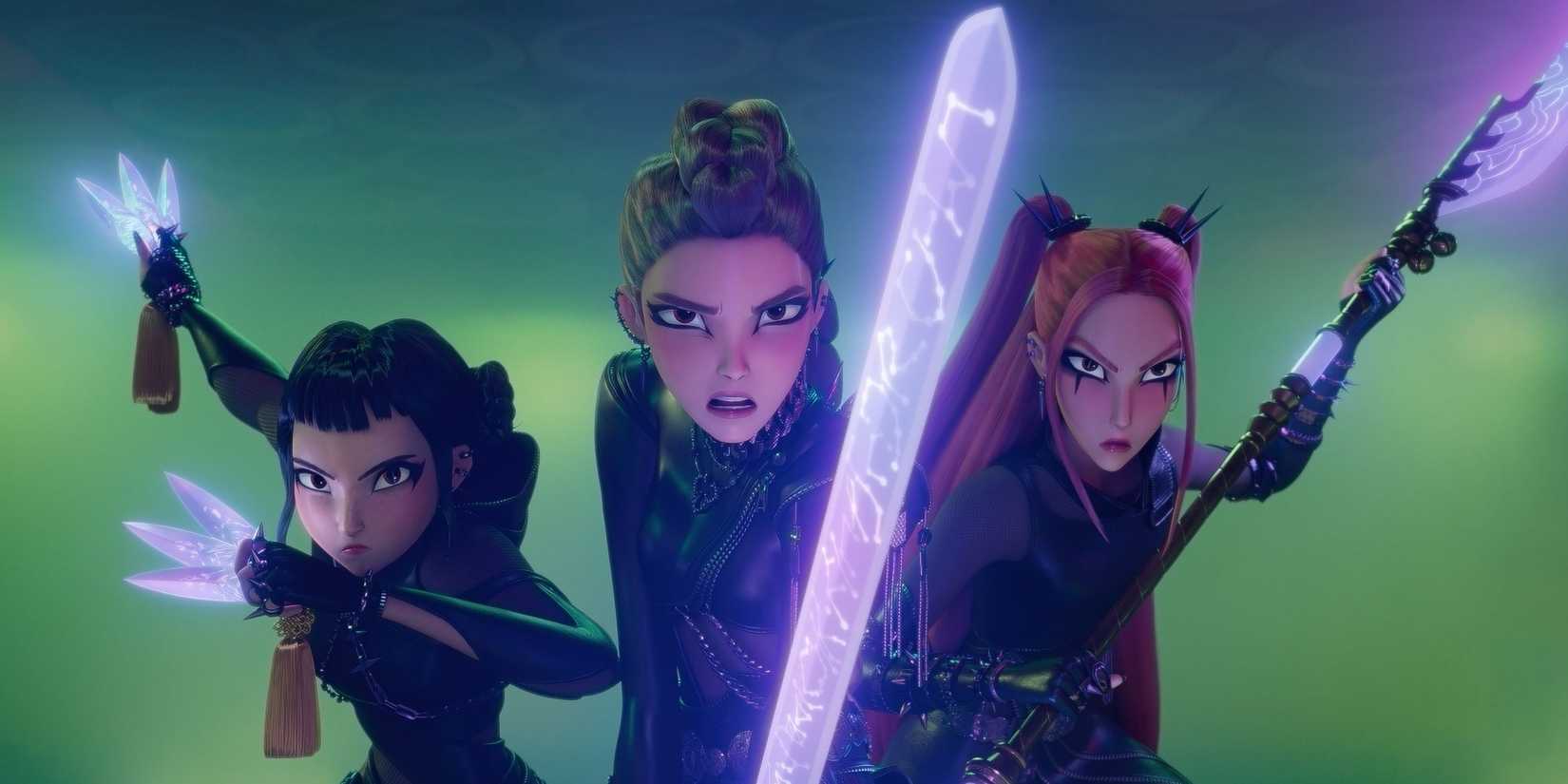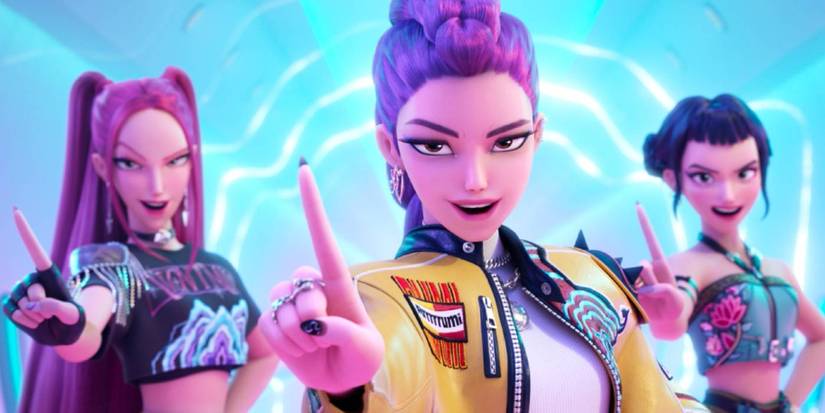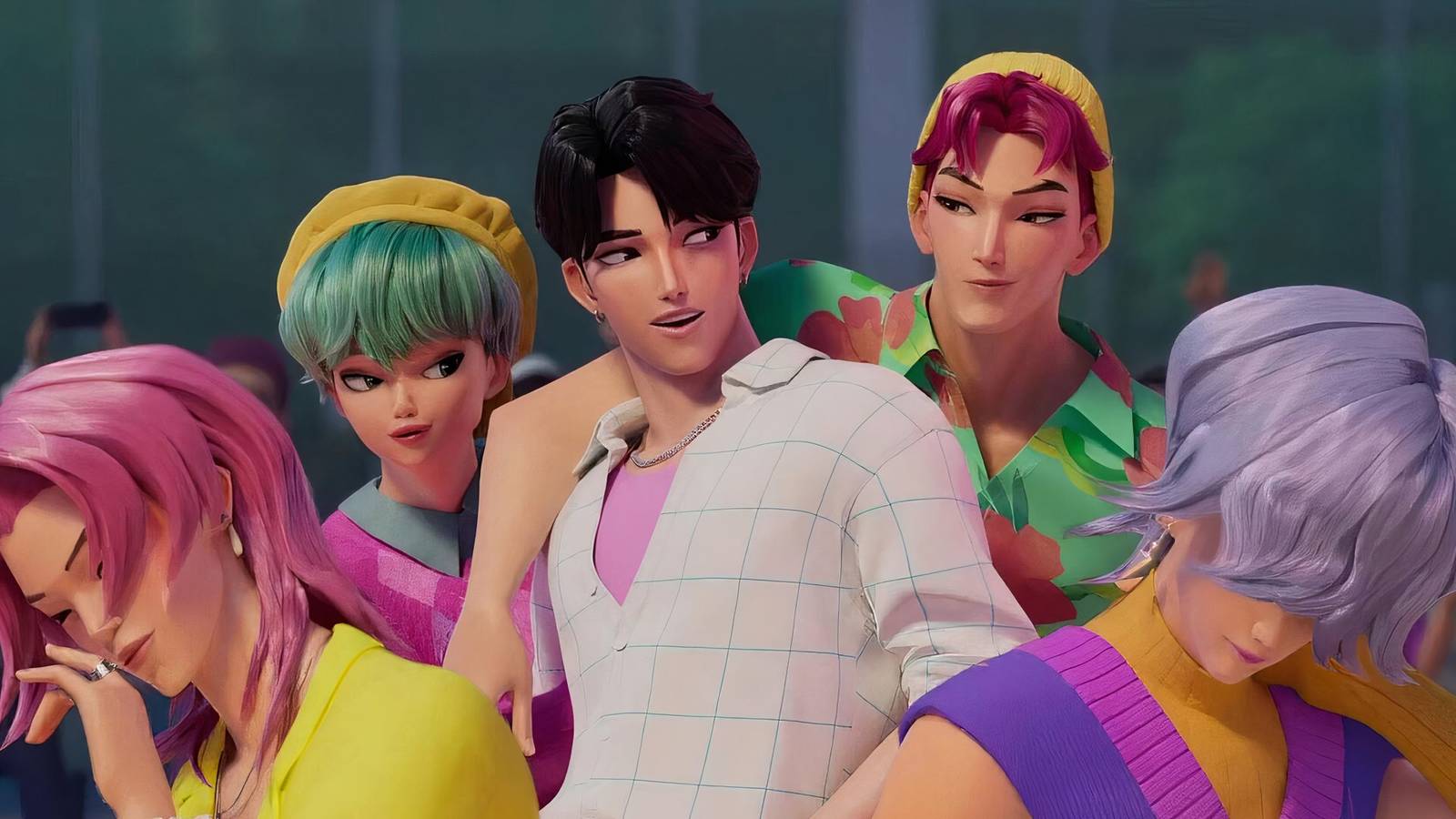KPop Demon Hunters has become one of the most groundbreaking films of 2025. It’s currently the most popular film on Netflix of all time, sitting at 291.5 million views. The film is a fantastic generational bridge, as its colorful animation and quirky characters make it extremely enjoyable for children, the catchy music alluring to K-pop and music fans, and the action-packed sequences and supernatural elements entice fantasy/adventure viewers from across the globe. The film isn’t just performing well numerically, but also critically, scoring 96% on Rotten Tomatoes, 7.6/10 on IMDB and 3.6/5 on Letterboxd.
The film, centering around two K-pop bands, also features many songs that viewers haven’t been able to get out of their heads, with “Golden” reaching 550.9 million streams on Spotify and “Soda Pop” reaching 320.9 million streams. The overarching themes of embracing one’s flaws and accepting support from loved ones during hard times are also more relevant than ever and have fostered immense audience relatability. The themes in the film are handled mostly well, particularly through the character journeys of Rumi and Jinu. Still, there is one aspect of the film relating to its core messaging that feels disconnected from what it’s trying to portray.
The Explanation of the Existence of Demons Isn’t Really Elaborated On

Rumi, Mira, Zoey wield their soul weapons in KPop Demon Hunters.Credit: Image via Netflix
The world of Kpop Demon Hunters is a combination of fantasy and realism. The film takes place in modern-day Korea, but it implements the existence of demons, beings who hunger to feed on human souls and deliver them to their overlord, Gwi-Ma. The main band of the film, HUNTR/X, are descended from legendary, generation-spanning demon hunters whose sole purpose is to defeat demons, protect humanity and strengthen the Honmoon, an invisible layer created through the power of their voices.
The three main characters, Rumi, Mira and Zoey, all bring their own unique flair to the band, making them some of the film’s best characters. The three work beautifully together to create songs that unite and protect their fanbase with the end goal of solidifying the Honmoon, turning it gold, and blocking the demons completely from reaching the human world.
The beginning of the film sees the girls on top, as they come closer and closer to bringing the Honmoon to fruition. It is demanded by their mentor, Celine, that they not showcase their faults and fears and stay strong for their fans, as their belief in them helps power the Honmoon and keeps the demons at bay.
Everything seems perfect, but soon the main conflict of the film is revealed as Rumi is shown to possess “patterns,” which is a common demon identifier. She is the hybrid daughter of a demon and a hunter and lives with the constant shame that she shares traits with the very creature she is meant to destroy. She hides her patterns from Mira and Zoey, always wearing long sleeves and never joining them at the bathhouse despite their consistent requests. Rumi also pushes the girls out of a hiatus with a new single release to strengthen the Honmoon faster, as Celine has told her that when it’s at its full strength, her patterns will disappear, and she won’t have to hide anymore.
Rumi’s plan works at first but is thwarted when a demon named Jinu, with the permission of Gwi-Ma, establishes his own rival KPop boy band, the Saja Boys, who quickly capture the attention of fans and HUNTR/X. The girls are dead set on destroying the Saja Boys, but Jinu ends up seeing Rumi’s patterns, causing him to ask more questions about her origins. The two eventually develop a deep connection and budding romance, and Jinu’s true intentions and traumatic past are revealed.
At first, he tells Rumi that he was enticed by Gwi-Ma, who promised to bring his family out of poverty, but eventually, he was condemned to live under Gwi-Ma’s rule. It’s then revealed that Jinu only brought himself out of poverty with Gwi-Ma’s help, and he’s haunted by the thoughts of abandoning his family, which is why he makes another deal with Gwi-Ma that if he helps destroy the Honmoon, his horrific memories will be erased.
As Jinu and Rumi grow closer, audiences learn more and more about demons and how they come to be. While not made entirely clear by the film, it seems that many, if not all, demons start out as humans but are plagued by Gwi-Ma’s voice when they encounter great adversity. Gwi-Ma highlights the characters’ worst fears and insecurities, making it unbearable to be constantly reminded of what haunts them the most about themselves. This even happens to Mira and Zoey towards the end of the film after Rumi’s secret is eventually revealed.
Mira is told that she will never have a family or belong, while Zoey is told that she is too much and not good enough. Rumi, of course, is haunted by her patterns and the pressure to be a perfect, undaunted hunter, despite knowing that her father was a demon. Through talking with Jinu, we see Rumi start to soften towards demons, even attempting to talk to some of them in battle. Her friends are oblivious as to why Rumi is acting the way she is, which reinforces her fear that her friends will see her as a monster if they knew the truth.
Why Is Rumi Entitled to a Happy Ending, But the Other Demons Aren’t?

Huntrix dances in KPop Demon Hunters.Credit: Image via Netflix
When Rumi’s patterns are revealed to Mira and Zoey, they turn on her, heartbroken that she has hidden the fact that she’s a half-demon from them. It’s at her lowest, though, that Rumi can see that she gets to choose who to be, and she returns to bring HUNTR/X back together and save humanity. In a climactic final battle, Jinu finally does the right thing and sacrifices himself for Rumi, allowing her and the rest of HUNTR/X to defeat Gwi-Ma and create a new, stronger Honmoon.
Though the conclusion is satisfying and Rumi overcomes her shame and insecurity, the same can’t be said for Jinu or the other demon, and this is where the film falters in its storytelling. The story presents an interesting question about good versus evil and whether it’s possible to redeem oneself even after they’ve made terrible mistakes. This ending, specifically how the film positions the fates of Rumi and Jinu, seems to take a strong chance that redemption is only possible for certain types of characters, which is narratively confusing and even a little problematic.
It’s said by Jinu that all demons do is feel and that they’re plagued by the voice of Gwi-Ma, exacerbating their insecurities, resulting in them becoming soulless-like creatures whose sole purpose is to feed on humanity. Rumi’s parents are also never significantly mentioned, and it’s only stated that her mother was a hunter and her father was a demon. It’s unclear how Rumi’s mother became sympathetic to, and eventually fell in love with, Rumi’s father, or if that even was the case. Still, it likely resembled Rumi’s relationship with Jinu, starting as a rivalry before developing into a compassionate union.
If it’s truly the case that all demons feel, and they are just regular humans who are victims of Gwi-Ma’s cruelty, why is HUNTR/X still shown killing demons at the end of the film? There is no reluctance to these actions either; Zoey and Mira are shown slaughtering the rest of the members of the Saja Boys, making quipping comments about how they find them attractive, but they have to seize their destiny and kill them. This is entirely contradictory to the central theme of accepting one’s faults and mistakes and learning from them. It can be argued that Jinu was the only one who learned from his misdeeds, but he still died in the end.
Other demons could also have the opportunity to grow and develop, like Jinu, and be free of Gwi-Ma, but they’re never given the chance to because they are subsequently killed by HUNTR/X. It’s almost as if the film is saying that one is only capable of salvation from their mistakes if they are strong enough to overcome the traumas associated with them. While HUNTR/X’s win is triumphant, it seems incredibly unfair that so many demons have to suffer and die when, in reality, they’re probably as human as HUNTR/X’s loyal fans but have been contorted into the worst versions of themselves.
If Rumi didn’t find the strength to rise above her insecurities, Mira and Zoey would likely have been on their way to becoming demons as we see them fall victim to Gwi-Ma’s voice. A more uplifting and narratively strong ending would’ve seen Gwi-Ma’s defeat catalyze the freeing of all the demon souls, or even returning them to their original form, but no such scene is ever shown. This lack of attention to fully developing the lore of the demons raises questions like these that weaken the film’s overall excellence, leaving room for a more fleshed-out and poignant story. There is a powerful scene where Rumi confronts Celine, asking her why she couldn’t love and accept her the way she was. Celine, still blinded by her rigid views, says that the Honmoon can still be fixed if Rumi covers up, and they tell the girls her patterns were an illusion inflicted upon her by Gwi-Ma, but Rumi vows not to hide anymore before saying that she’s glad to see the Honmoon destroyed. Shortly after, however, Rumi finds her strength and reunites with the rest of HUNTR/X, culminating in the epic finale. A new and better Honmoon is created, which is seemingly what Rumi wanted, but it does not include the freedom of the demons, which is antithetical to how Rumi truly feels.
There are still plenty of strengths within the central story told in KPop Demon Hunters. Emphasizing how uplifting and even life-altering it can be to reach out to friends and family during tumultuous points in one’s life makes audience members feel seen and catalyzes conversations surrounding mental health. However, because of the delicate nature of these topics, they need to be handled with care, and filmmakers must illustrate a clear point through the cinematic language of the film. Rumi’s journey is a captivating one, but it’s unfortunate that her journey ends in victory while Jinu’s ends with the end of his life.
A sequel film is already in development, leaving fans theorizing what will be next for the hunters and what new threats they will face. Another film set in the world of KPop Demon Hunters also brings up whether more world-building will be established and elaborated upon. The film may also focus on other members of HUNTR/X and their personal conflicts, as Mira and Zoey are both shown to struggle with insecurities. It’s most likely too early to make any predictions, but based on how KPop Demon Hunters handled this aspect of its story, it would elevate the first film if the second delved more into the lore of demons and just how crucial they are to this world.

